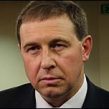
ILLARIONOV SAYS PUTIN BROUGHT ABOUT ECONOMIC GROWTH AND AUTOCRACY
Publication: Eurasia Daily Monitor Volume: 5 Issue: 77
By:

Andrei Illarionov has always been something of an anomaly: an economist of a libertarian bent who always stressed the negative impact of state intervention while working as an adviser to several top officials associated with a corporatist or even authoritarian outlook. From 1993 to 1994 Illarionov headed the Analysis and Planning Group of Prime Minister Viktor Chernomyrdin, who had previously headed Gazprom, the mammoth gas monopoly, which was then (and still is) almost synonymous with financial opacity and worse. Indeed, Illarionov himself, no doubt in part reflecting on his experience in the government, wrote in Kommersant in January 1996, “The country has already chosen its model of development. It is close to the pre-reform Latin American economies.” Illarionov predicted that Russia would continue to move in the direction of “a highly monopolized economy with large and, as a rule, incompetent state interference,” and that by the year 2000 its economy would resemble that of Argentina during the rule of Juan Peron (Moscow Times, January 4, 1996).
Despite his prescience, Illarionov returned to government service in 2000, this time as senior economic adviser to President Vladimir Putin. While he was able to help mitigate state interference in Russia’s economy somewhat, he played an important role in introducing the 13 percent flat income tax rate and in repaying Russia’s foreign debt. He resigned his post at the end of 2005, protesting the Putin administration’s increasingly authoritarian tendencies. Today, he is a senior researcher at the libertarian Cato Institute in Washington, D.C., and last year participated in marches organized by Garry Kasparov’s opposition coalition that were held in Moscow and Saint Petersburg.
With the end of Putin’s second and last constitutional presidential term in sight (whether or not he will remain in power de facto is an open question), Illarionov recently tallied the results of Putin’s eight years in power in an interview published on the www.gazeta.ru website.
The first result had been “the institutionalization of economic growth,” meaning “the creation of economic institutions for economic growth,” Illarionov said. This process included “the creation of a package of reforms at the beginning and the consolidation of a lower level of state expenditures in comparison with the 1990s and the earlier period. . . . The significant lowering of the state’s burden on the economy, together with the increase in oil prices, turned out to be one of the most important factors in providing the country with stable economic growth rates of about 7 percent per year.”
The second result of Putin’s eight years in office, according to Illarionov, was “the destruction of legal and political institutions” in Russia, including a competitive electoral system, independent media and a system of checks and balances. Putin’s tenure, he said, also saw “the practical destruction of political rights and radical limitation of civil freedoms” along with the creation of a “hierarchical state with new social castes,” the highest of which consisted of “corporations of members of the special services.”
The third result had been “the destruction of the military system of an imperial army,” Illarionov said. “A reduction in the financing for the armed forces took place in the 1990s, but it did not affect the organization,” he said. “Now the liquidation of the system was taking place.”
The fourth result of Putin’s rule had been “the integration of the political elite and business elite of Russia into the modern world simultaneously with the foreign policy isolation of the country. . . . The level of integration of the [Russian] business elite into the world elite has no precedence in the history of our country, including in the pre-revolutionary period,” he added. “This means that part of the world elite in the West has become a pillar of support for the current political regime in Russia to a much greater degree than United Russia, [the pro-Kremlin youth group] Nashi, Molodaya Gvardia [Young Guard, another pro-Kremlin youth group] and the other organizations of that type put together.”
The fifth result of Putin’s rule, according to Illarionov, was “the desecration, discrediting and decomposition of the secret police and a number of other power agencies.”
The sixth result: “Along with the flight of capital and brain drain, the flight of institutions has reached massive proportions,” Illarionov said. “As a result of the destruction of Russian legal institutions and owing to the opportunities offered by globalization, there has been a sharp growth in demand for essential legal institutions located exclusively outside Russia. The impossibility of defending human rights inside the country is forcing citizens to appeal to human rights courts abroad. The impossibility of protecting property in the Basmanny [district] court [of Moscow] forces one to turn to floating one’s shares on the London or New York stock exchanges, and for the registration of companies, to the Swiss [canton] of Zug. This concerns not only private entrepreneurs but also state officials, who are the owners of large assets, which is a confirmation . . . of the absence of a legal system even for them.”
The seventh result of Putin’s rule was “the intensive preparation for the next step in Russia’s decolonization and disintegration,” said Illarionov. “The central authorities’ real control over the national republics has decreased a lot over the past eight years from what it was in the 1990s,” he said. “Chechnya received de facto independence, as recent events have confirmed. Russia has turned into a financier of the Kadyrov regime, and other national republics are also on the way to receiving de facto independence” (www.gazeta.ru, April 22).




